
Backgammon is a two-player board game played with counters and dice on tables boards. It is the most widespread Western member of the large family of tables games, whose ancestors date back nearly 5,000 years to the regions of Mesopotamia and Persia. The earliest record of backgammon itself dates to 17th-century England, being descended from the 16th-century game of Irish.

Ludo is a strategy board game for two to four players, in which the players race their four tokens from start to finish according to the rolls of a single die. Like other cross and circle games, Ludo is derived from Bharat, the Indian game Pachisi. The game and its variations are popular in many countries and under various names.

Monopoly is a multiplayer economics-themed board game. In the game, players roll two dice to move around the game board, buying and trading properties and developing them with houses and hotels. Players collect rent from their opponents and aim to drive them into bankruptcy. Money can also be gained or lost through Chance and Community Chest cards and tax squares. Players receive a salary every time they pass "Go" and can end up in jail, from which they cannot move until they have met one of three conditions. House rules, hundreds of different editions, many spin-offs, and related media exist.
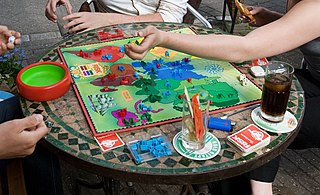
Risk is a strategy board game of diplomacy, conflict and conquest for two to six players. The standard version is played on a board depicting a political map of the world, divided into 42 territories, which are grouped into six continents. Turns rotate among players who control armies of playing pieces with which they attempt to capture territories from other players, with results determined by dice rolls. Players may form and dissolve alliances during the course of the game. The goal of the game is to occupy every territory on the board and, in doing so, eliminate the other players. The game can be lengthy, requiring several hours to multiple days to finish. European versions are structured so that each player has a limited "secret mission" objective that shortens the game.
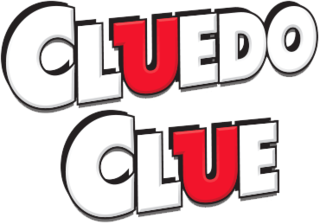
Cluedo, known as Clue in North America, is a murder mystery game for three to six players that was devised in 1943 by British board game designer Anthony E. Pratt. The game was first manufactured by Waddingtons in the United Kingdom in 1949. Since then, it has been relaunched and updated several times, and it is currently owned and published by the American game and toy company Hasbro.
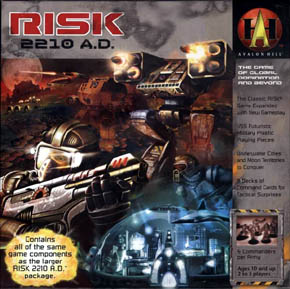
Risk 2210 A.D. is a 2–5 player board game by Avalon Hill that is a futuristic variant of the classic board game Risk. Risk 2210 A.D. was designed by Rob Daviau and Craig Van Ness and first released in 2001. In 2002, it won the Origins Award for "Best Science Fiction or Fantasy Board Game of 2001".
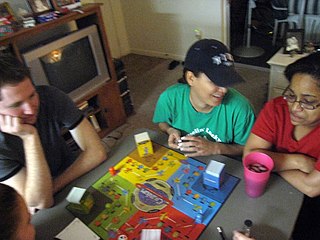
Cranium is a party game created by Whit Alexander and Richard Tait in 1998. Initially, Cranium was sold through Amazon.com and the Starbucks coffee chain, then-novel methods of distribution. After selling 44 million copies of Cranium and its sister titles, the game's manufacturer Cranium, Inc. was bought by Hasbro, Inc. for $77.5 million in 2008. Billed as "The Game for Your Whole Brain", Cranium includes a wide variety of activities, unlike many other party games. Giorgio Davanzo handles packaging and branding for the game, and the artwork is by cartoonist Gary Baseman.
In tabletop games and video games, game mechanics are the rules or ludemes that govern and guide the player's actions, as well as the game's response to them. A rule is an instruction on how to play, a ludeme is an element of play like the L-shaped move of the knight in chess. A game's mechanics thus effectively specify how the game will work for the people who play it.

SolarQuest is a space-age real estate trading board game published in 1985 and developed by Valen Brost, who conceived the idea in 1976. The game is patterned after Monopoly, but it replaces pewter tokens with rocket ships and hotels with metallic fuel stations. Players travel around the Sun acquiring monopolies of planets, moons, and man-made space structures. They seek to knock their opponents out of the game through bankruptcy, as well as optional laser blasts and dwindling fuel supplies.

Acey-deucey is a tables game, a family of board games that includes backgammon. Since World War I, it has been a favorite game of the United States Navy, Marine Corps, and Merchant Marine. Some evidence shows that it was played in the early 1900s aboard U.S. Navy ships. The game is believed to be rooted in the Middle East, Greece, or Turkey, where there were variants in which the game started with pieces off the board.

Battle Masters is a miniature wargame by Milton Bradley, made in collaboration with Games Workshop in 1992. It is thematically similar to Warhammer Fantasy Battle, but with much simpler game mechanics. Like other Milton Bradley/Games Workshop partnership board games HeroQuest and Space Crusade, Battle Masters was designed by Stephen Baker, who later went on to design the popular game Heroscape.
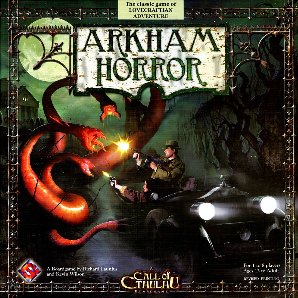
Arkham Horror is a cooperative adventure board game designed by Richard Launius, originally published in 1987 by Chaosium. The game is based on Chaosium's roleplaying game Call of Cthulhu, which is set in the Cthulhu mythos of H.P. Lovecraft and other horror writers. The game's second edition was released by Fantasy Flight Games in 2005, with a third edition in 2018.
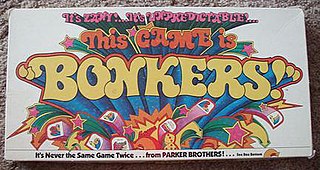
Bonkers! is a race-style board game designed by Paul J. Gruen and produced first by Parker Brothers, later by Milton Bradley, and briefly reissued by Winning Moves. The object is to be the first player to score 12 points by adding instruction cards to the empty spaces in an attempt to move to several scoring stations. The game's slogan is "It's Never the Same Game Twice!"

Tsuro is a tile-based board game designed by Tom McMurchie, originally published by WizKids and now published by Calliope Games.
Minion Hunter is a board game published in 1992 by Game Designers' Workshop in conjunction with their Dark Conspiracy role-playing game. The game is designed to encourage the players to work cooperatively to stall or defeat the plans of four Dark Minion races as a primary goal, with individual advancement a secondary objective.

Starfarers of Catan is a multiplayer board game loosely based on the Settlers of Catan series of games. It was created by Klaus Teuber as an official spin-off and is distributed by Kosmos in German and Mayfair Games in English.

Outrage!, "the official Tower of London board game", was first created in 1992 by Imperial Games. Players move about the board, which depicts the Tower of London, and attempt to steal the British Crown Jewels. In reality, the only modern attempt to steal the Jewels was made in 1671 by Thomas Blood and his accomplices, who failed to escape — an earlier attempt in the early fourteenth century was equally unsuccessful — and the game challenges players to "succeed where they failed".
The fictional universe of the Discworld novels by Terry Pratchett features a number of invented games, some of which have gone on to spawn real-world variants.
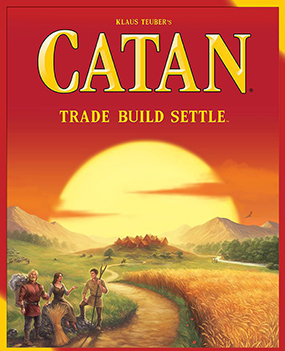
Catan, previously known as The Settlers of Catan or simply Settlers, is a multiplayer board game designed by Klaus Teuber. It was first published in 1995 in Germany by Franckh-Kosmos Verlag (Kosmos) as Die Siedler von Catan. Players take on the roles of settlers, each attempting to build and develop holdings while trading and acquiring resources. Players gain victory points as their settlements grow and the first to reach a set number of victory points, typically 10, wins. The game and its many expansions are also published by Catan Studio, Filosofia, GP, Inc., 999 Games, Κάισσα (Káissa), and Devir. Upon its release, The Settlers of Catan became one of the first Eurogames to achieve popularity outside Europe. As of 2020, more than 32 million copies in 40 languages had been sold.
The Genius: Black Garnet is the third season of The Genius. It debuted on tvN on October 1, 2014.
















